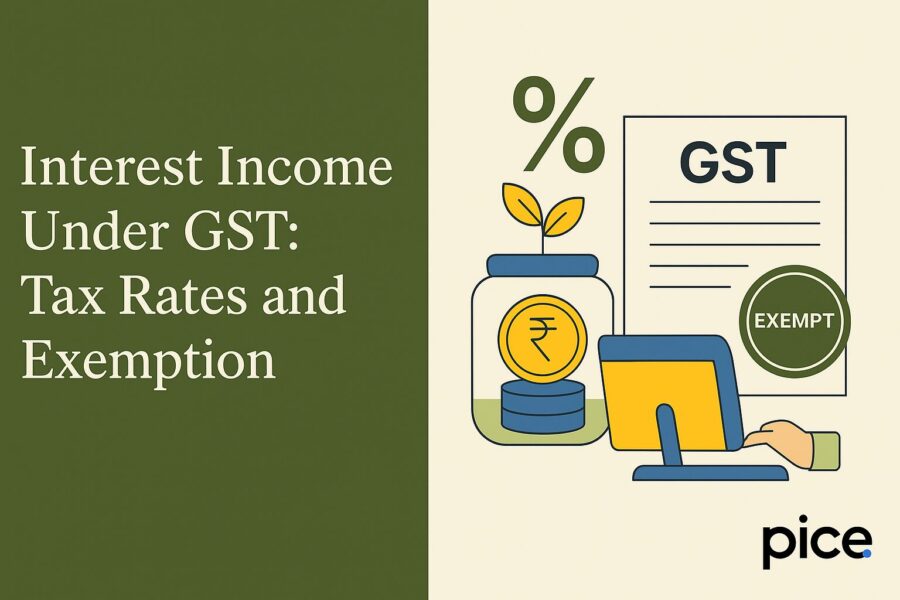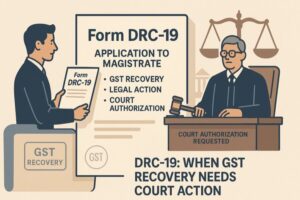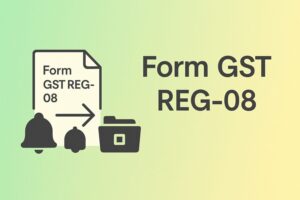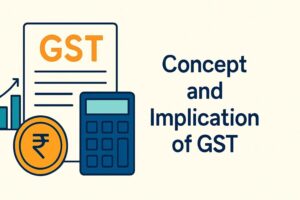Interest Income Under GST: Tax Rates and Exemption
- 17 Nov 25
- 8 mins

Interest Income Under GST: Tax Rates and Exemption
Key Takeaways
- Pure interest income from loans, deposits, and bank savings is fully exempt from GST under Schedule III.
- GST at 18% applies only to interest on credit card outstanding amounts and other incidental financial services.
- Loan processing, prepayment charges, and ancillary banking services attract 18% GST, but the loan interest itself remains exempt.
- Delayed EMIs and financial penalties may attract GST, but RBI’s 2025 guidelines exempt penal charges from GST.
- Inter-company loan interest, FD interest, and EMI interest (when billed separately) are GST-exempt as they involve pure use of money.
What happens when you earn interest on a loan or pay interest on your credit card? Are both treated the same under GST law?
Let us take the case of Mrs Shetty, who lent ₹5,00,000 to a company and earns ₹50,000 annually in interest, this income is exempt from GST. But if she delays a credit card payment, she may end up paying 18% GST on the interest charged.
Clearly, the treatment of interest income under GST varies with the nature of the transaction. In this article, we break down the GST rules, tax rates, and exemptions applicable to different types of interest income.
Concept of Interest Income under GST
According to Section 2(75) of the CGST Act, money is neither considered a good nor a service. However, the way money is utilised, such as lending or deposit-taking, can be treated as a financial service. GST is applicable only when there is a supply of goods or services.
For example, when Mrs Shetty buys a mobile phone worth ₹10,000, it is a supply of goods. In this context, she will pay 18% GST along with the mobile phone's price.
So, she will be paying (₹10,000 + ₹1,800 GST) = ₹11,800.
Offering loans or taking deposits, on the other hand, is not taxable since in the traditional sense, these do not involve any supply of goods or services. Therefore, even though the income procured through interest is a financial arrangement, the GST Act identifies it as subject to no GST.
GST Rate on Interest Income
Interest income refers to earnings from lending money or investing in financial products like fixed deposits, savings accounts, bonds, or loans. For businesses, it may include interest earned from delayed payments or credit sales.
This type of income is passive for both individuals as well as for businesses. It is more of a compensation for the time value of money and not as a service or sale. If interest income were not exempted, then the normal 18% GST rate would be levied.
GST on Interest in Specific Contexts
Here is a detailed discussion on specific contexts of interest income under GST:
- Interest Income of Banks and NBFCs
Banks and NBFCs mostly earn from the interest on loans and from paying interest on deposits. As per the Schedule III, this type of interest is GST exempted. However, when a bank processes a loan, it is a service, therefore, in this context, 18% GST is applicable.
- Loans and Advances
All kinds of ordinary loans such as personal, education, and vehicle loans fall under the GST-exempt category. However, since loan prepayment is considered a service, it has GST applicability.
- Interest on Delayed Payments
The Authority of Advance Ruling (AAR) has decided that delayed EMI payments and loan defaults are subject to GST applicability.
However, according to the RBI's latest guidelines published in January 2025, no GST is applicable on penal charges. For example, if someone has missed paying EMI, and the bank charges a late fee of ₹500, no GST will be levied on that late fee amount.
- Inter-company Borrowings
If one company lends a loan to another company, there will be no GST applicable on the loan interest amount. For example, if ABC company lends ₹50,00,000 to XYZ company for 1 year and asks for a 10% interest, no GST will be levied on the interest income of ₹5,00,000.
- EMIs and Hire-Purchases
If a supplier separately invoices interest components for EMIs, no GST will be applicable. However, if the invoice is not separate, then the interest amount is considered a taxable part of the good or service. In that case, GST will be levied.
Exemptions for Interest Income under GST
Several provisions within the GST framework provide clarity on interest income exemptions:
- Entry 27 of Notification no. 12/2017 under CGST Act 2017
It has been stated that if a person or a business offers a loan and earns interest in return, that amount is exempted from GST. However, if the interest amount is earned from credit card services, 18% GST is applicable.
- Entry 28 of Notification no. 9/2017 under the CGST Act 2017
This entry ensured the continuity of the previously mentioned interest income under GST exemptions.
- Schedule III under the CGST Act
Schedule III particularly defined activities that are completely out of the scope of GST regime. For example, bank activities, like interests in bank deposits are out of GST scope. This means that when banks pay interest on deposits or savings, that amount is not taxable.
Exempt vs. Taxable Components of Interest Income
Here you need to understand that not all kinds of money-related payments are exempted. In this section, we will discuss the exempt vs taxable components.
| Exempted Components | Taxable Components |
| Interests on deposits and loans | Interests earned on credit card outstanding amount |
| Interests earned on savings account | 2. Delayed payments, late fees |
| FDs, loan repayments | 3. Penalty on selling goods and services |
| Interests earned by NBFCs | 4. No-cost EMIs |
From the list, it is evident that when the nature of the loan is pure, GST is exempted. Whenever there are incidental charges involved, GST is levied. We will discuss this further in the following section.
Conclusion
Interest income is common across financial activities, and confusion often arises about its GST treatment. The GST law makes a clear distinction, pure financial transactions involving the use of money (like loans or deposits) are exempt, while any incidental services or penalties tied to the interest may attract 18% GST.
Understanding these nuances is crucial for individual taxpayers, businesses, and financial institutions to ensure compliance and avoid unnecessary tax burdens.
Whether you are a depositor, lender, or business owner dealing with delayed payments, being aware of GST exemptions and liabilities on interest income under GST will help you make informed financial decisions.
💡If you want to streamline your payment and make GST payments via credit, debit card or UPI, consider using the PICE App. Explore the PICE App today and take your business to new heights.
 By
By 
















